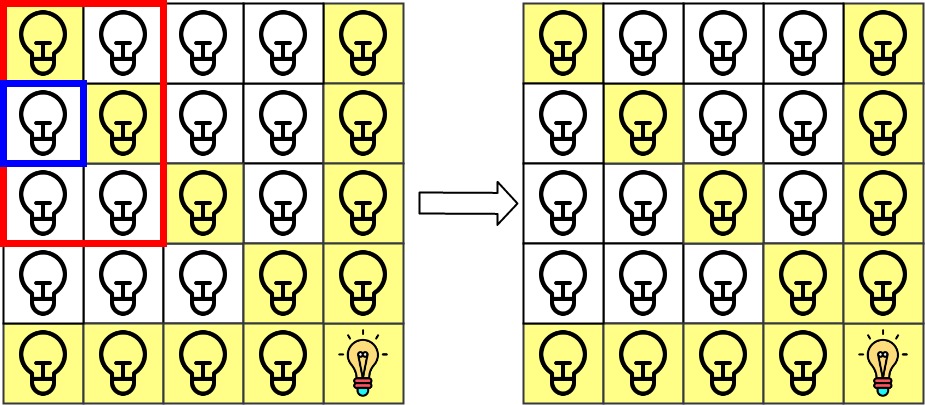1001. Grid Illumination
Description
There is a 2D grid of size n x n where each cell of this grid has a lamp that is initially turned off.
You are given a 2D array of lamp positions lamps, where lamps[i] = [rowi, coli] indicates that the lamp at grid[rowi][coli] is turned on. Even if the same lamp is listed more than once, it is turned on.
When a lamp is turned on, it illuminates its cell and all other cells in the same row, column, or diagonal.
You are also given another 2D array queries, where queries[j] = [rowj, colj]. For the jth query, determine whether grid[rowj][colj] is illuminated or not. After answering the jth query, turn off the lamp at grid[rowj][colj] and its 8 adjacent lamps if they exist. A lamp is adjacent if its cell shares either a side or corner with grid[rowj][colj].
Return an array of integers ans, where ans[j] should be 1 if the cell in the jth query was illuminated, or 0 if the lamp was not.
Example 1:

Input: n = 5, lamps = [[0,0],[4,4]], queries = [[1,1],[1,0]] Output: [1,0] Explanation: We have the initial grid with all lamps turned off. In the above picture we see the grid after turning on the lamp at grid[0][0] then turning on the lamp at grid[4][4]. The 0th query asks if the lamp at grid[1][1] is illuminated or not (the blue square). It is illuminated, so set ans[0] = 1. Then, we turn off all lamps in the red square.The 1st query asks if the lamp at grid[1][0] is illuminated or not (the blue square). It is not illuminated, so set ans[1] = 0. Then, we turn off all lamps in the red rectangle.

Example 2:
Input: n = 5, lamps = [[0,0],[4,4]], queries = [[1,1],[1,1]] Output: [1,1]
Example 3:
Input: n = 5, lamps = [[0,0],[0,4]], queries = [[0,4],[0,1],[1,4]] Output: [1,1,0]
Constraints:
1 <= n <= 1090 <= lamps.length <= 200000 <= queries.length <= 20000lamps[i].length == 20 <= rowi, coli < nqueries[j].length == 20 <= rowj, colj < n
Solutions
Solution: Hash Table
- Time complexity: O(lamps.length + queries.length)
- Space complexity: O(lamps.length)
JavaScript
/**
* @param {number} n
* @param {number[][]} lamps
* @param {number[][]} queries
* @return {number[]}
*/
const gridIllumination = function (n, lamps, queries) {
const lampsSet = new Set();
const rowMemo = new Map();
const colMemo = new Map();
const diagonalMemo = new Map();
const negativeDiagonalMemo = new Map();
const adjacent = [
[-1, -1],
[-1, 0],
[-1, 1],
[0, -1],
[0, 0],
[0, 1],
[1, -1],
[1, 0],
[1, 1],
];
for (const [row, col] of lamps) {
const key = `${row},${col}`;
if (lampsSet.has(key)) continue;
lampsSet.add(key);
rowMemo.set(row, (rowMemo.get(row) ?? 0) + 1);
colMemo.set(col, (colMemo.get(col) ?? 0) + 1);
diagonalMemo.set(row + col, (diagonalMemo.get(row + col) ?? 0) + 1);
negativeDiagonalMemo.set(row - col, (negativeDiagonalMemo.get(row - col) ?? 0) + 1);
}
return queries.map(([row, col]) => {
const isIllumination =
rowMemo.get(row) || colMemo.get(col) || diagonalMemo.get(row + col) || negativeDiagonalMemo.get(row - col);
for (const offset of adjacent) {
const offsetRow = row + offset[0];
const offsetCol = col + offset[1];
const key = `${offsetRow},${offsetCol}`;
if (offsetRow < 0 || offsetRow >= n || offsetCol < 0 || offsetCol >= n) continue;
if (!lampsSet.has(key)) continue;
const rowCount = rowMemo.get(offsetRow) - 1;
const colCount = colMemo.get(offsetCol) - 1;
const diagonalCount = diagonalMemo.get(offsetRow + offsetCol) - 1;
const negativeDiagonalCount = negativeDiagonalMemo.get(offsetRow - offsetCol) - 1;
rowCount ? rowMemo.set(offsetRow, rowCount) : rowMemo.delete(offsetRow);
colCount ? colMemo.set(offsetCol, colCount) : colMemo.delete(offsetCol);
diagonalCount
? diagonalMemo.set(offsetRow + offsetCol, diagonalCount)
: diagonalMemo.delete(offsetRow + offsetCol);
negativeDiagonalCount
? negativeDiagonalMemo.set(offsetRow - offsetCol, negativeDiagonalCount)
: negativeDiagonalMemo.delete(offsetRow - offsetCol);
lampsSet.delete(key);
}
return isIllumination ? 1 : 0;
});
};